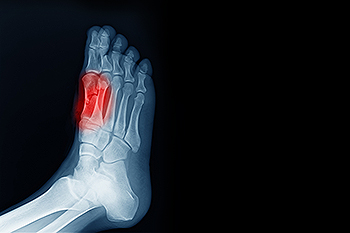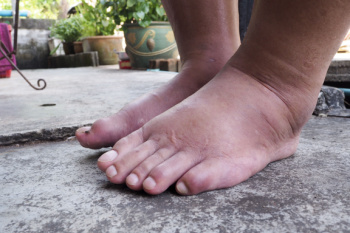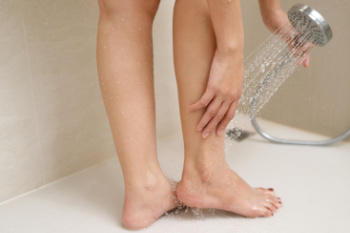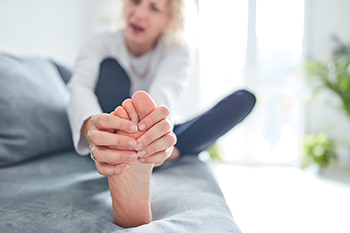Call Us Today! (203) 975-9600
SAME DAY APPOINTMENTS AVAILABLE
March 2024
Recognizing Symptoms From Sesamoiditis

Sesamoiditis, a condition affecting the sesamoid bones beneath the big toe joint, manifests through various symptoms that can significantly impact mobility and comfort. Common indicators of sesamoiditis include pain and tenderness in the ball of the foot, particularly beneath the big toe. Individuals may experience discomfort when bearing weight on the affected foot, especially during activities such as walking, running, or squatting. Swelling and inflammation around the sesamoid bones are also prevalent symptoms of this condition, contributing to heightened discomfort and limited mobility. In some cases, individuals may notice difficulty bending or straightening the big toe due to the pain and stiffness associated with sesamoiditis. The symptoms of sesamoiditis can vary in intensity, ranging from mild discomfort to severe pain that interferes with daily activities. If you have difficulty walking, it is suggested that you visit a podiatrist who can diagnose and treat sesamoiditis.
Sesamoiditis is an unpleasant foot condition characterized by pain in the balls of the feet. If you think you’re struggling with sesamoiditis, contact one of our podiatrists of Preferred Footcare, LLC. Our doctors will treat your condition thoroughly and effectively.
Sesamoiditis
Sesamoiditis is a condition of the foot that affects the ball of the foot. It is more common in younger people than it is in older people. It can also occur with people who have begun a new exercise program, since their bodies are adjusting to the new physical regimen. Pain may also be caused by the inflammation of tendons surrounding the bones. It is important to seek treatment in its early stages because if you ignore the pain, this condition can lead to more serious problems such as severe irritation and bone fractures.
Causes of Sesamoiditis
- Sudden increase in activity
- Increase in physically strenuous movement without a proper warm up or build up
- Foot structure: those who have smaller, bonier feet or those with a high arch may be more susceptible
Treatment for sesamoiditis is non-invasive and simple. Doctors may recommend a strict rest period where the patient forgoes most physical activity. This will help give the patient time to heal their feet through limited activity. For serious cases, it is best to speak with your doctor to determine a treatment option that will help your specific needs.
If you have any questions please feel free to contact our office located in Stamford, CT . We offer the newest diagnostic and treatment technologies for all your foot and ankle needs.
Custom Orthotics For Ankle Stability

Step with assurance, thanks to enhanced ankle stability from orthotics! If you're active and on the move, Custom Orthotics are your ally for stronger, steadier ankles. They align your foot and ankle, reducing the risk of sprains and offering solid support for every stride. Don’t let instability hold you back. Try Custom Orthotics from our office, and discover unshakable confidence in every step!
Various Reasons to Have Swollen Ankles

Swollen feet and ankles, a prevalent ailment, can result from various factors. One primary cause is fluid retention, often stemming from prolonged periods of standing or sitting. The body's natural ability to circulate fluids may be compromised, leading to accumulation in the lower extremities. Similarly, injury or trauma can trigger swelling as the body responds to the damage, initiating an inflammatory response. Chronic conditions, such as venous insufficiency or lymphedema, can also contribute to the persistent swelling of feet and ankles. Another key factor is poor circulation, which hampers the efficient movement of blood and fluids, promoting retention in the lower limbs. Additionally, certain medications may induce swelling as a side effect, necessitating attention to dosage and potential alternatives. If your feet and ankles are swollen, it is suggested that you consult a podiatrist who can determine the reason why, and offer effective relief and treatment tips.
Swollen feet can be a sign of an underlying condition. If you have any concerns, contact one of our podiatrists of Preferred Footcare, LLC. Our doctors can provide the care you need to keep you pain-free and on your feet.
Swollen feet are a common ailment among pregnant women and people who stand or sit for extended periods. Aging may increase the possibility of swollen feet and patients who are obese often notice when their feet are swelling too. There may be medical reasons why swollen feet occur:
- Phlebitis - A condition that causes the veins to become inflamed and can also cause leg pain.
- Liver disease - This may lead to low blood levels of albumin which is a protein. This can cause fluid in the blood to pass into the tissues and several areas of the body can become swollen.
- Heart failure - When the heart doesn’t pump properly the blood that is normally pumped back to the heart can pool in the veins of the legs causing swollen feet.
- Kidney disease - One of the main functions of the kidneys is releasing excess fluid in the body. This type of condition can make it difficult for the kidneys to function properly, and as a result the feet may become swollen.
- Deep-vein thrombosis (DVT)- This is a serious condition where blood clots form in the veins of the legs. They can block the return of blood from the legs to the heart which may cause the feet to swell. It is important to be treated by a podiatrist if this condition is present.
Swollen feet can also be caused by bone and tendon conditions, including fractures, arthritis, and tendinitis. Additionally, there may be skin and toenail conditions and an infection may cause the feet to swell. Patients who take medicine to treat high blood pressure may be prone to getting swollen feet.
Many patients elevate their feet to help relieve the swelling and this is generally a temporary remedy. When a podiatrist is consulted the reason behind the swelling can be uncovered and subsequently treated.
If you have any questions please feel free to contact our office located in Stamford, CT . We offer the newest diagnostic tools and technology to treat your foot and ankle needs.
The Effect of Orthotics on Gait

Foot orthotics play an important role in improving gait mechanics and alleviating the discomfort associated with various foot conditions. Custom-made foot orthotics are designed to provide support, stability, and realignment to the foot and ankle connection. Research suggests that foot orthotics can positively affect gait by reducing excessive pronation, controlling foot motion, and redistributing pressure across the foot surface. By correcting biomechanical imbalances and enhancing foot function, orthotics can help to alleviate pain, prevent injuries, and improve overall mobility and stability during walking and other weight-bearing activities. Whether prescribed for addressing specific foot ailments or enhancing athletic performance, foot orthotics offer a non-invasive and effective solution for optimizing gait mechanics and promoting foot health. If you are interested in discussing how custom-made foot orthotics can improve your gait, it is suggested that you consult with a podiatrist who can speak with you about your specific needs.
If you’re experiencing foot discomfort, have a history of foot and ankle injuries, or are interested in exploring Custom orthotics, don’t hesitate to contact one of our podiatrists at Preferred Footcare, LLC. Our doctors is dedicated to offering the care required to help you remain pain-free and stay on your feet.
What are Custom Orthotics?
Custom orthotics refer to custom inserts designed for placement in different shoe types, including athletic and formal footwear, with the purpose of alleviating a spectrum of foot-related problems such as flat feet, heel pain, and overall foot discomfort. These inserts are instrumental in providing relief and comfort for a diverse range of foot conditions, including heel pain, and can also act as a proactive approach to injury prevention.
Medical Grade Shoe Inserts:
A diverse array of shoe inserts is available for addressing foot pain, heel discomfort, and minor issues. For instance, you can place arch supports in your shoes to rectify overarched or flat feet, and gel and cushioned insoles are frequently chosen for the comfort and relief they provide from foot and heel pain by reducing pressure.
If you have any questions please contact our office located in Stamford, CT . We offer the newest diagnostic and treatment technologies for all your foot and ankle needs.
Wounds That Don't Heal Need to Be Checked
Tips for Maintaining Healthy Feet

Healthy feet are vital for overall well-being, supporting us through countless steps each day. Incorporating simple everyday foot care tips into your usual routine can help keep your feet happy and pain-free. Start by washing your feet daily with warm water and mild soap, paying attention to the spaces between your toes. Moisturize your feet regularly to prevent dryness and cracking, focusing on the heels and soles. Trim your toenails straight across to avoid ingrown nails, and file them gently to smooth any rough edges. Choose comfortable and supportive footwear that fits well and provides adequate cushioning and arch support. It is helpful to rotate your shoes to allow them to air out and reduce moisture buildup. Practice good foot hygiene in communal areas like gyms and swimming pools by wearing flip-flops or shower shoes. Finally, incorporate stretching and strengthening exercises into your routine to maintain flexibility and strength in your feet and ankles. If you are seeking additional everyday foot care tips, it is suggested that you consult a podiatrist who can provide you with the knowledge you are seeking.
Everyday foot care is very important to prevent infection and other foot ailments. If you need your feet checked, contact one of our podiatrists from Preferred Footcare, LLC. Our doctors can provide the care you need to keep you pain-free and on your feet.
Everyday Foot Care
Often, people take care of their bodies, face and hair more so than they do for their feet. But the feet are a very important aspect of our bodies, and one that we should pay more attention to. Without our feet, we would not be able to perform most daily tasks.
It is best to check your feet regularly to make sure there are no new bruises or cuts that you may not have noticed before. For dry feet, moisturizer can easily be a remedy and can be applied as often as necessary to the affected areas. Wearing shoes that fit well can also help you maintain good foot health, as well as making it easier to walk and do daily activities without the stress or pain of ill-fitting shoes, high heels, or even flip flops. Wearing clean socks with closed shoes is important to ensure that sweat and bacteria do not accumulate within the shoe. Clean socks help to prevent Athlete’s foot, fungi problems, bad odors, and can absorb sweat.
If you have any questions please feel free to contact our office located in Stamford, CT . We offer the newest diagnostic and treatment technologies for all your foot and ankle needs.
Pain in the Ball of the Foot

Pain in the ball of the foot can be a discomforting and debilitating issue that can affect daily activities. This type of pain can occur due to various factors, including excessive pressure, overuse, or structural abnormalities in the foot. Metatarsalgia, a condition characterized by inflammation and pain in the ball of the foot, is a common culprit. High-impact activities, prolonged standing, and wearing improper footwear with inadequate support can exacerbate the pain. Additionally, conditions such as Morton's neuroma, sesamoiditis, and arthritis can contribute to discomfort in this area. Individuals may experience symptoms like burning, tingling, or numbness in the ball of the foot, making it challenging to walk or stand for extended periods. Proper footwear selection, orthotics, and rest are essential for alleviating pain and preventing further injury. If you have pain in the ball of your foot, it is suggested to seek treatment from a podiatrist who can help identify the underlying cause and develop an effective management plan.
Foot Pain
Foot pain can be extremely painful and debilitating. If you have a foot pain, consult with one of our podiatrists from Preferred Footcare, LLC. Our doctors will assess your condition and provide you with quality foot and ankle treatment.
Causes
Foot pain is a very broad condition that could be caused by one or more ailments. The most common include:
- Bunions
- Hammertoes
- Plantar Fasciitis
- Bone Spurs
- Corns
- Tarsal Tunnel Syndrome
- Ingrown Toenails
- Arthritis (such as Gout, Rheumatoid, and Osteoarthritis)
- Flat Feet
- Injury (from stress fractures, broken toe, foot, ankle, Achilles tendon ruptures, and sprains)
- And more
Diagnosis
To figure out the cause of foot pain, podiatrists utilize several different methods. This can range from simple visual inspections and sensation tests to X-rays and MRI scans. Prior medical history, family medical history, and any recent physical traumatic events will all be taken into consideration for a proper diagnosis.
Treatment
Treatment depends upon the cause of the foot pain. Whether it is resting, staying off the foot, or having surgery; podiatrists have a number of treatment options available for foot pain.
If you have any questions, please feel free to contact our office located in Stamford, CT . We offer the newest diagnostic and treatment technologies for all your foot care needs.









